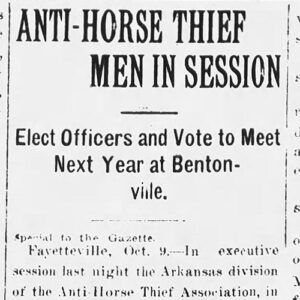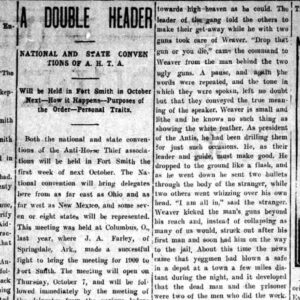calsfoundation@cals.org
Anti-Horse Thief Association (AHTA)
A number of vigilance groups were created in the United States in an effort to prevent and punish the theft of horses, but the most notable was the Anti-Horse Thief Association (AHTA), which was founded in Missouri in 1863. Operating like a fraternal lodge, complete with passwords and initiation ceremonies, the organization presented itself as a supplement to law enforcement.
At the time the AHTA was established, horse thievery was considered a crime of the greatest severity. As historian Lynn Strawberry wrote in her master’s thesis on the AHTA: “Horses were a necessity of frontier life. They were needed for clearing forests, plowing ground and hauling freight as well as personal transportation. Horse thieves would be miles away before the sheriff could be notified. In reality, the only hope one had of retrieving stolen livestock was to go after the thief. If some neighbors went along, so much the better.”
In Arkansas, a number of lynchings were motivated by alleged acts of horse thievery, especially in the 1870s, starting with the lynching of a man known only as McDonald on December 25, 1870, in Marion County. A Mississippi County farmer named Elias Holt was killed in 1872 due to allegations that he was part of a horse theft ring. Three men were lynched in present-day Logan County in 1874 after having reportedly stolen several horses from local residents. In total, perhaps as many as eleven men were lynched on allegations of horse theft in Arkansas during the 1870s, all of them white.
Vigilance groups aimed at tackling the problem of horse theft arose not long after the Revolutionary War. The foremost such association was the AHTA, established in Clark County, Missouri, in 1863, although founder David McKee had reportedly formed an earlier such group in 1854. The organization pitched itself not only as a vigilance group, with men banded together for the protection of property, but also as a supplement to law enforcement, serving as a detective organization that worked to recover stolen property and bring wrongdoers to justice.
In Arkansas, a notable predecessor to the AHTA was the Independent Order of the Knights of the Horse (IOKH), which was founded in Crawford County in 1876. Soon, there were IOKH chapters across northwestern Arkansas, and the organization’s operations reportedly extended into Indian Territory (present-day Oklahoma). In 1902, regional leaders of the AHTA met with representatives of the Knights of the Horse and agreed to merge their two groups. The Arkansas AHTA was granted its own charter in 1906 and held its first convention the following year in Fayetteville (Washington County), by which time the organization had more than 1,500 members. Many prominent citizens were members of the AHTA, including Isaac G. Combs, president of the Arkansas National Bank. Although the AHTA emphasized its protective and detective mission, it also served a social function, hosting picnics and other social events.
In 1915, Fayetteville hosted the national organization’s annual meeting, with seventy-five delegates from across the country joining 125 or so state delegates. With the rise of the poultry industry in Arkansas, the AHTA began to tackle chicken thievery, too. However, by the following year, the order had begun to experience a decline in Arkansas, and the 1916 state convention in Bentonville (Benton County) voted to de-emphasize investigating horse theft for the moral education of the young. According to Strawberry, the organization began to wane in popularity in the 1920s due to the rise of more “exciting” social groups such as the renewed Ku Klux Klan and the decreasing importance of horses in people’s lives and economies, especially as the automobile became more affordable.
By 1926, the national organization had renamed itself the Anti-Thief Association (ATA), dropping any connection to horses entirely. The 1940 national convention of the ATA was held in Siloam Springs (Benton County), but that was the last time the state hosted the national organization. The lodge at Green Forest (Carroll County) was one of the last active lodges in the state, but the organization in Arkansas seems to have collapsed entirely by the 1950s.
For additional information:
“Anti-Horse Thief Men in Session,” Arkansas Gazette, October 10, 1915.
“Good Work Has Been Done.” Springdale Twice-a-Week News, April 27, 1909.
Strawberry, Lynn. “‘Protect the Innocent and Bring the Guilty to Justice’: The Anti-Horse Thief Association in Western Arkansas.” MA thesis, University of Arkansas, 1995.
Staff of the CALS Encyclopedia of Arkansas
 Early Twentieth Century, 1901 through 1940
Early Twentieth Century, 1901 through 1940 Law
Law Anti-Horse Thief Association Story
Anti-Horse Thief Association Story  Anti-Horse Thief Association Story
Anti-Horse Thief Association Story 




Comments
No comments on this entry yet.